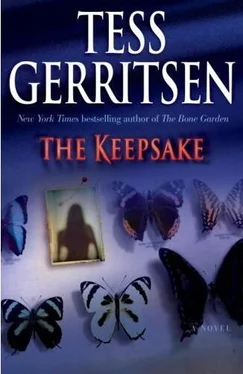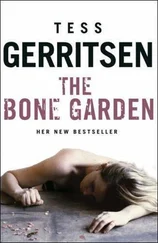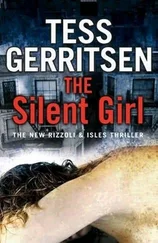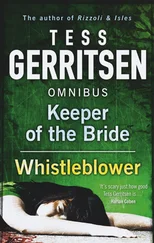“Well, she can’t protect me now. And she shouldn’t have to.” Josephine rose and carried her cup to the sink. “This has nothing to do with her.”
“Doesn’t it?”
“She was never in Boston. She never had anything to do with the Crispin Museum.” Josephine turned to Gemma. “Did she?”
Gemma shook her head. “I can’t think of any reason why the museum should have those links to her. The cartouche, the newspaper.”
“Coincidence, maybe.”
“That’s too much coincidence.” Gemma wrapped her hands around her teacup, as though to ward off a sudden chill. “What about the body in your car? What are the police doing about it?”
“What they’re supposed to do in a murder case. They’ll investigate. They’ve asked me all the questions you’d expect. Who might be stalking me? Do I have any sick admirers? Is there anyone from the past I’m afraid of? If they keep asking questions, it’s only a matter of time before they find out who Josephine Pulcillo really is.”
“They may not bother to dig that up. They’ve got murders to solve, and you’re not the one they’re interested in.”
“I couldn’t take that risk. That’s why I ran. I packed up and left a job I loved and a city I loved. I was happy there, Gemma. It’s an odd little museum, but I liked working there.”
“And the people? Is there any chance one of them might be involved?”
“I don’t see it.”
“Sometimes you can’t see it.”
“They’re completely harmless. The curator, the director-they’re both such kind men.” She gave a sad laugh. “I wonder what they’ll think of me now. When they find out who they really hired.”
“They hired a brilliant young archaeologist. A woman who deserves a better life.”
“Well, this is the life I got.” She turned on the faucet to rinse her cup. The kitchen was organized exactly as it had always been, and she found the dish towels in the same cabinet, the spoons in the same drawer. Like any good archaeological dig, Gemma’s kitchen stood preserved in a state of domestic eternity. What a luxury to have roots, thought Josephine as she placed the clean cup back on the shelf. What would it be like to own a home, to build a life she would never have to abandon?
“What are you going to do now?” asked Gemma.
“I don’t know.”
“You could go back to Mexico. She’d want that.”
“I’ll just have to start over again.” The prospect of that suddenly made Josephine sag against the countertop. “God, I’ve lost twelve years of my life.”
“Maybe you haven’t. Maybe the police will drop the ball.”
“I can’t count on that.”
“Watch and wait. See what happens. This house will be empty for most of the summer. I need to be back in Peru in two weeks, to oversee the excavation. You’re welcome to stay here as long as you need to.”
“I don’t want to cause you any trouble.”
“Trouble?” Gemma shook her head. “You have no idea what kind of trouble your mother saved me from. Anyway, I’m not convinced the police are as clever as you think they are. Or as thorough. Think how many cases go unsolved, how many mistakes we hear about in the news.”
“You haven’t met this detective.”
“What about him?”
“It’s a her. The way she looks at me, the questions she asks-”
“A woman?” Gemma’s eyebrow twitched upward. “Oh, that’s too bad.”
“Why?”
“Men are so easily distracted by a pretty face.”
“If Detective Rizzoli keeps digging, she’s eventually going to end up here. Talking to you.”
“So let them come. What are they going to find out?” Gemma waved at her kitchen. “Look around! They’ll walk in here, get a look at all my herbal teas, and dismiss me as some harmless old hippie who couldn’t possibly tell them anything useful. When you’re a fifty-year-old woman, no one really bothers to look at you anymore, much less value your opinion. It’s hard on the old ego. But damn, it does make it easy to get away with a lot.”
Josephine laughed. “So all I have to do is wait till I’m fifty and I’m home free?”
“You may be home free already, as far as the police are concerned.”
Josephine said softly: “It’s not just the police who scare me. Not after those notes. Not after what was left in my car.”
“No,” Gemma agreed. “There are worse things to be afraid of.” She paused, then looked across the table at Josephine. “So why are you still alive?”
The question startled Josephine. “You think I should be dead.”
“Why would some weirdo waste time scaring you with creepy little notes? With grotesque gifts in your car? Why not just kill you?”
“Maybe because the police are involved? Ever since the scan of Madam X, they’ve been hovering around the museum.”
“Another thing puzzles me. Putting a body in your car seems designed to draw attention to you. The police are watching you now. It’s a strange move if someone really wants you dead.”
The statement was typical for Gemma: factual and brutally blunt. Someone wants you dead. But I am dead, she thought. Twelve years ago, the girl I used to be dropped off the face of the earth. And Josephine Pulcillo was born.
“She wouldn’t want you dealing with this all alone, Josie. Let’s make that phone call.”
“No. It’s safer for everyone if we don’t. If they’re watching me, that’s just what they’re waiting for.” She took a breath. “I’ve managed on my own since college and I can deal with this, too. I just need some time to catch my breath. Throw a dart at the map and decide where to go next.” She paused. “And I think I’ll need some cash.”
“There’s still about twenty-five thousand dollars left in the account. It’s been sitting there for you. Waiting for a rainy day.”
“I think this qualifies.” Josephine stood to leave the room. In the kitchen doorway she stopped and looked back. “Thank you for everything you’ve done. For me. And for my mother.”
“I owe it to her, Josie.” Gemma looked down at her burn-scarred arms. “It’s only because of Medea that I’m still alive.”
On Saturday night, Daniel finally came to her.
At the last minute, before he arrived, Maura rushed out to the local market where she bought kalamata olives and French cheeses and a far-too-extravagant bottle of wine. This is the way I’ll woo a lover, she thought as she handed over her credit card. With smiles and kisses and glasses of Pinot Noir. I will win him over with perfect evenings that he’ll never forget, never stop craving. And someday, maybe, he’ll make his choice. He’ll choose me.
When she got home, he was already waiting for her in her house.
As the garage door rolled open, she saw his car parked inside where the neighbors wouldn’t see it, where it would cause no raised eyebrows, no lascivious gossip. She pulled in beside it and quickly closed the garage door again, shutting off any view of the blatant evidence that she was not alone tonight. Keeping secrets so easily becomes second nature, and it was automatic for her now to close the garage door, to draw the curtains and smoothly fend off the innocent queries from colleagues and neighbors. Are you seeing someone? Would you like to come to dinner? Would you like to meet this nice man I know? Over the months, she’d declined so many such invitations that few were now offered. Had everyone simply given up on her, or had they guessed the reason for her disinterest, for her unsociability?
That reason was standing in the doorway, waiting for her.
She stepped into the house, into Daniel Brophy’s arms. It had been ten days since they’d last been together, ten days of ever-deepening longing that was now so gnawing she could not wait to satisfy it. The groceries were still in the car, and she had dinner to cook, but food was the last thing on her mind as their lips met. Daniel was all she wanted to devour, and she feasted on him as they kissed their way into her bedroom, guilty kisses made all the more delicious because they were illicit. How many new sins will we commit this evening, she wondered as she watched him unbutton his shirt. Tonight he did not wear his clerical collar; tonight he came to her as a lover, not a man of God.
Читать дальше












